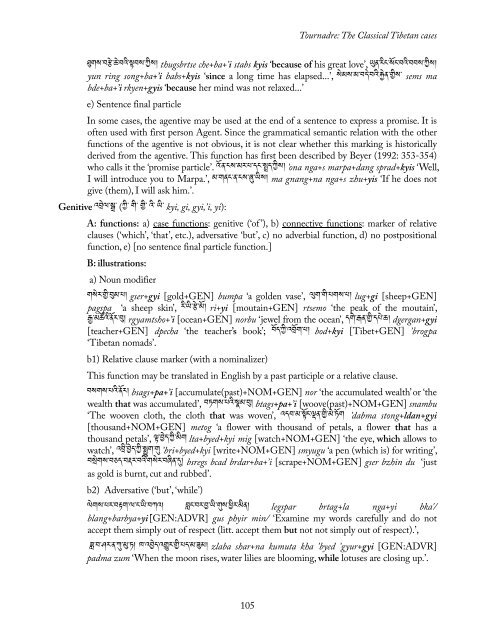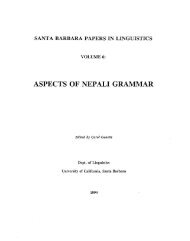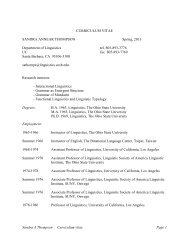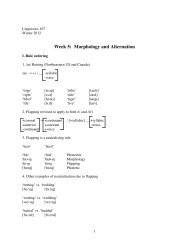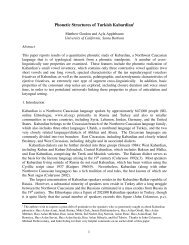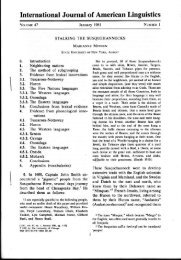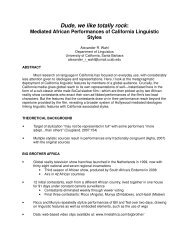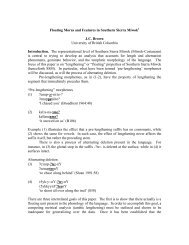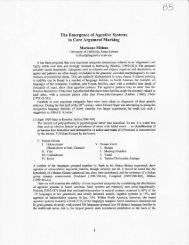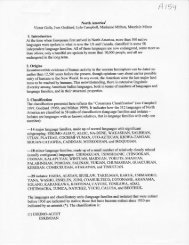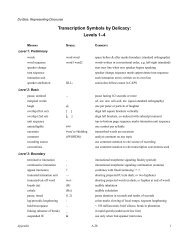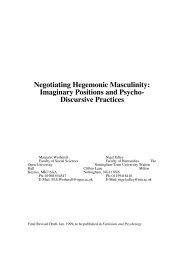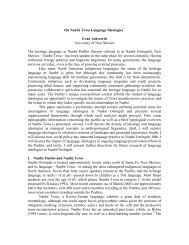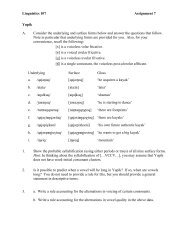The Classical Tibetan cases and their transcategoriality
The Classical Tibetan cases and their transcategoriality
The Classical Tibetan cases and their transcategoriality
Create successful ePaper yourself
Turn your PDF publications into a flip-book with our unique Google optimized e-Paper software.
105<br />
Tournadre: <strong>The</strong> <strong>Classical</strong> <strong>Tibetan</strong> <strong>cases</strong><br />
ཐུགས་བརྩེ་ཆེ་བའི་སྟབས་ཀྱིས། thugsbrtse che+ba+’i stabs kyis ‘because of his great love’, ཡུན་རིང་སོང་བའི་བབས་ཀྱིས།<br />
yun ring song+ba+’i babs+kyis ‘since a long time has elapsed...’, སེམས་མ་བདེ་བའི་རྐྱེན་གྱིས་ sems ma<br />
bde+ba+’i rkyen+gyis ‘because her mind was not relaxed...’<br />
e) Sentence final particle<br />
In some <strong>cases</strong>, the agentive may be used at the end of a sentence to express a promise. It is<br />
often used with first person Agent. Since the grammatical semantic relation with the other<br />
functions of the agentive is not obvious, it is not clear whether this marking is historically<br />
derived from the agentive. This function has first been described by Beyer (1992: 353-354)<br />
who calls it the ‘promise particle’. འོ་ན་ངས་མར་པ་དང་སྤྲད་ཀྱིས། ’ona nga+s marpa+dang sprad+kyis ‘Well,<br />
I will introduce you to Marpa.’, མ་གནང་ན་ངས་ཞུ་ཡིས། ma gnang+na nga+s zhu+yis ‘If he does not<br />
give (them), I will ask him.’.<br />
Genitive འབྲེལ་སྒྲ་ (ཀྱི་ གི་ གྱི་ འི་ ཡི་ kyi, gi, gyi,’i, yi):<br />
A: functions: a) case functions: genitive (‘of ’), b) connective functions: marker of relative<br />
clauses (‘which’, ‘that’, etc.), adversative ‘but’, c) no adverbial function, d) no postpositional<br />
function, e) [no sentence final particle function.]<br />
B: illustrations:<br />
a) Noun modifier<br />
གསེར་གྱི་བུམ་པ། gser+gyi [gold+GEN] bumpa ‘a golden vase’, ལུག་གི་པགས་པ། lug+gi [sheep+GEN]<br />
pagspa ‘a sheep skin’, རི་ཡི་རྩེ་མོ། ri+yi [moutain+GEN] rtsemo ‘the peak of the moutain’,<br />
རྒྱ་མཚོའི་ནོར་བུ། rgyamtsho+’i [ocean+GEN] norbu ‘jewel from the ocean’, དགེ་རྒན་གྱི་དཔེ་ཆ། dgergan+gyi<br />
[teacher+GEN] dpecha ‘the teacher’s book’; བོད་ཀྱི་འབྲོག་པ། bod+kyi [Tibet+GEN] ’brogpa<br />
‘<strong>Tibetan</strong> nomads’.<br />
b1) Relative clause marker (with a nominalizer)<br />
This function may be translated in English by a past participle or a relative clause.<br />
བསགས་པའི་ནོར། bsags+pa+’i [accumulate(past)+NOM+GEN] nor ‘the accumulated wealth’ or ‘the<br />
wealth that was accumulated’, བཏགས་པའི་སྣམ་བུ། btags+pa+’i [woove(past)+NOM+GEN] snambu<br />
‘<strong>The</strong> wooven cloth, the cloth that was woven’, འདབ་མ་སྟོང་ལྡན་གྱི་མེ་ཏོག ’dabma stong+ldan+gyi<br />
[thous<strong>and</strong>+NOM+GEN] metog ‘a flower with thous<strong>and</strong> of petals, a flower that has a<br />
thous<strong>and</strong> petals’, ལྟ་བྱེད་ཀྱི་མིག lta+byed+kyi mig [watch+NOM+GEN] ‘the eye, which allows to<br />
watch’, འབྲི་བྱེད་ཀྱི་སྨྱུག་གུ ’bri+byed+kyi [write+NOM+GEN] smyugu ‘a pen (which is) for writing’,<br />
བསྲེགས་བཅད་བརྡར་བའི་གསེར་བཞིན་དུ། bsregs bcad brdar+ba+’i [scrape+NOM+GEN] gser bzhin du ‘just<br />
as gold is burnt, cut <strong>and</strong> rubbed’.<br />
b2) Adversative (‘but’, ‘while’)<br />
ལེགས་པར་བརྟག་ལ་ང་ཡི་བཀའ། བླང་བར་བྱ་ཡི་གུས་ཕྱིར་མིན། legspar brtag+la nga+yi bka'/<br />
blang+barbya+yi་[GEN:ADVR] gus phyir min/ ‘Examine my words carefully <strong>and</strong> do not<br />
accept them simply out of respect (litt. accept them but not not simply out of respect).’,<br />
ཟླ་བ་ཤར་ན་ཀུ་མུ་ཏ། ཁ་འབྱེད་འགྱུར་གྱི་པད་མ་ཟུམ། zlaba shar+na kumuta kha ’byed ’gyur+gyi [GEN:ADVR]<br />
padma zum ‘When the moon rises, water lilies are blooming, while lotuses are closing up.’.


